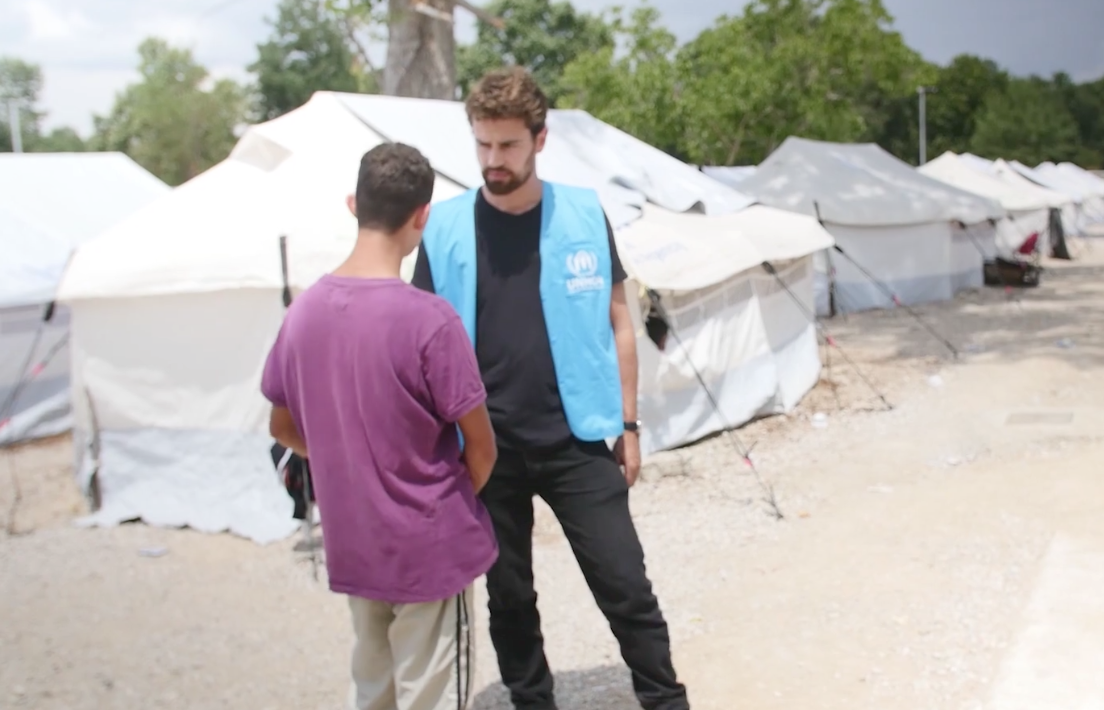
Theo James wants to help share the stories of Syrian refugees who have been displaced from their homes.
The British actor, known for his work on The Divergent Series and the Underworld movies and currently starring in the London play Sex With Strangers, says he is driven by a personal connection to their plight: his Greek grandfather Nicholas Taptiklis fled Athens during World War II, eventually making it to Damascus, Syria. According to the United Nations Refugee Agency, Taptiklis later worked for the organization that was a precursor to the UNHCR to fight the spread of typhoid and tuberculosis in refugee camps.
As a High Profile Supporter with the UNHCR, James traveled to Athens in 2016 to visit refugee camps holding Syrians who had fled their country in an effort to learn more about the crisis. Since the start of the civil war in Syria, 11 million people have been displaced throughout the world. Tens of thousands of refugees have run to Greece, and now live in camps—run both officially and unofficially—scattered throughout the country.
James says reading his grandfather’s diary, which detailed his escape, shed light on the situation unfolding in Syria.
“It made me think of how quickly we are able to forget recent history,” James says in reference to World War II. “Because it is so recent, but now, it seems so far away. It rammed home the fact that the situation we’re in at the moment is the biggest humanitarian crisis since then.”
What James gleaned from the visit to the camps was how refugees who had left Syria were “generally regular” people, a contrast to how the crisis is often portrayed in the news. During his visit, he met families who had led full lives back in Syria—one man and his wife, who were in a camp with their three children, had previously worked as attorneys.
“The way it’s presented is single males ravenously looking for job opportunities, or, in the worst case scenarios, fear-mongering about terrorism or enforcing culture,” James says. “But it’s families trying to save themselves and their kids. And they have the same ambitions they had when they left Syria.”
He was also struck by the conditions of refugee camps, and the long waiting periods refugee families face before they are resettled into new countries. Some families wait for years before even getting on the lengthy waiting lists to be resettled, James said, leaving enormous gaps in their lives. According to James, negative attitudes and political rhetoric toward refugees and immigrants in Europe and the U.S. don’t help the situation.
“I think the mistake is to view these people as opportunists or trying to grift a system or trying to infiltrate with plans for aggression against Europe or America,” he says. “These people are leaving because they have to, and they don’t want to leave. They’re escaping death.”
Correction: The original version of this story misidentified the agency where Nicholas Taptiklis worked. He worked for a precursor to the United Nations Refugee Agency, not the agency itself.
More Must-Reads From TIME
- The 100 Most Influential People of 2024
- Coco Gauff Is Playing for Herself Now
- Scenes From Pro-Palestinian Encampments Across U.S. Universities
- 6 Compliments That Land Every Time
- If You're Dating Right Now , You're Brave: Column
- The AI That Could Heal a Divided Internet
- Fallout Is a Brilliant Model for the Future of Video Game Adaptations
- Want Weekly Recs on What to Watch, Read, and More? Sign Up for Worth Your Time
Write to Mahita Gajanan at mahita.gajanan@time.com